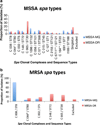Molecular characterization of Staphylococcus aureus from outpatients in the Caribbean reveals the presence of pandemic clones
- PMID: 21789605
- PMCID: PMC3226914
- DOI: 10.1007/s10096-011-1339-2
Molecular characterization of Staphylococcus aureus from outpatients in the Caribbean reveals the presence of pandemic clones
Abstract
Staphylococcus aureus infections continue to pose a global public health problem. Frequently, this epidemic is driven by the successful spread of single S. aureus clones within a geographic region, but international travel has been recognized as a potential risk factor for S. aureus infections. To study the molecular epidemiology of S. aureus infections in the Caribbean, a major international tourist destination, we collected methicillin-susceptible S. aureus (MSSA) and methicillin-resistant S. aureus (MRSA) isolates from community-onset infections in the Dominican Republic (n = 112) and Martinique (n = 143). Isolates were characterized by a combination of pulsed-field gel electrophoresis (PFGE), spa typing, and multilocus sequence typing (MLST) typing. In Martinique, MRSA infections (n = 56) were mainly caused by t304-ST8 strains (n = 44), whereas MSSA isolates were derived from genetically diverse backgrounds. Among MRSA strains (n = 22) from the Dominican Republic, ST5, ST30, and ST72 predominated, while ST30 t665-PVL+ (30/90) accounted for a substantial number of MSSA infections. Despite epidemiological differences in sample collections from both countries, a considerable number of MSSA infections (~10%) were caused by ST5 and ST398 isolates at each site. Further phylogenetic analysis suggests the presence of lineages shared by the two countries, followed by recent genetic diversification unique to each site. Our findings also imply the frequent import and exchange of international S. aureus strains in the Caribbean.
Figures


References
-
- Moran GJ, Krishnadasan A, Gorwitz RJ, et al. Methicillin-resistant S. aureus infections among patients in the emergency department. N Engl J Med. 2006;355:666–674. - PubMed
-
- Otter JA, French GL. Molecular epidemiology of community-associated meticillin-resistant Staphylococcus aureus in Europe. Lancet Infect Dis. 2010;10:227–239. - PubMed
-
- Nimmo GR, Coombs GW. Community-associated methicillin-resistant Staphylococcus aureus (MRSA) in Australia. Int J Antimicrob Agents. 2008;31:401–410. - PubMed
Publication types
MeSH terms
Grants and funding
LinkOut - more resources
Full Text Sources
Medical

